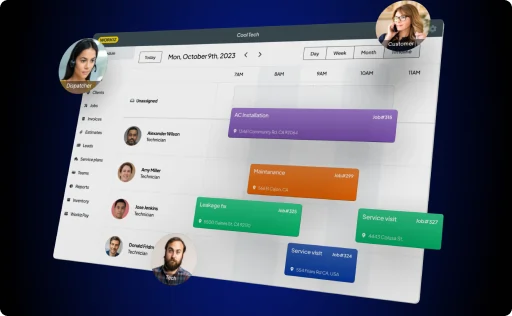There’s no doubt that the business world is undergoing a tectonic shift led by the introduction of (AI), which is now also set to completely revolutionize major aspects of the field service industry – ranging from operations to performance, and down to customer care.
Specifically in the small-to-medium-sized business (SMB) sector, AI adoption brings a growing surge of unmatched growth opportunities for over 5 million US businesses.
Not only is this uptake of AI-enhanced solutions set to transform SMB services such as plumbing, HVAC, and electrical maintenance from the consumer standpoint, but it’s also going to dramatically optimize time-consuming, costly, or manual processes using 3D printing, robotics, or electric vehicles.
That said, and as with all digital game-changers, what does AI adoption currently mean for the US’s 30 million field service employees?
As of now, the real-world applications of AI are firmly focused on the analysis and processing of existing data to rapidly increase productivity and enhance CX. In other words, field service professionals are not likely to be easily replaced by AI. These folks usually offer expert skills and invaluable experience that at this point in time, are simply no match to the more automation-focused capabilities of AI.
Practical use cases for AI in the field service industry
Field service management platform providers offer the required integration between siloed systems via a one-stop solution.
Let’s explore a few seemingly simple yet highly impactful scenarios, in which AI automation is transforming the industry from organized chaos to Swiss clock bliss:
- Smart AI driven GPS Tracking
- Better Scheduling process through technician location prediction
- Route Optimization based on technician location on a specific day
- Auto complete job data on invoices and sales proposals
- Enhanced Customer Service including notifications and communication
- Automated notification systems using SMS and voice.
Field service contractors can save time and cut costs on scheduling and dispatching, by accessing their customers’ data and complete job history as they arrive on-site, while backend data automation enables technicians to complete more jobs within a given time frame. Not only do these applications drive efficiency, but they also have a direct impact on businesses’ bottom line.
Plumbing contractors, for example, have traditionally ordered spare parts such as copper piping from external sources, as water pipes are usually of a standard structure. 3D printing of pipes and fittings, however, allows plumbers to customize more cost-efficient, plastic-based designs, in order to produce durable printed pipes precisely suited to individual site conditions.
Not only will 3D printing help cut costs dramatically, but will also help companies avoid unnecessary delays while waiting for spare parts to arrive.
Another potential performance-boosting use case is HVAC systems, where AI can safeguard building occupants while radically increasing efficiencies.
By integrating AI algorithms with temperature and occupancy sensors, heat levels can be regulated in individual rooms according to their occupancy. AI can also be used in conjunction with HVAC systems to monitor air quality in real- time, identifying potentially hazardous pollutants, humidity, and carbon dioxide levels – before reaching health-risking levels.
Lastly, AI-driven drones can benefit electricians by using thermal imaging cameras to inspect electrical circuits that are not safe for human access. Alternatively, AI-automated engineering can execute precise but repetitive tasks like panel installations or complex wiring.
Driving efficiency on all fronts
As all AI applications reside on digital systems, the introduction of these technologies into the field service industry will be driven by the field management software contractors use. According to industry experts, AI applications will follow the natural path of adaptation comprising three distinct horizons:
1. Leveraging existing data
In essence, leveraging existing data means automating processes based on the service contractor’s existing data regarding the customer information, status, and the required service.
For example, AI-driven chatbots provide around-the-clock personalized responses to customer queries – drawing on existing customer data.
2. Integrating external data
Tapping into data accessible through third parties, such as spare part suppliers and engineering companies, can add significant value to businesses’ customer experience and ability to operate more efficiently.
3. Dynamic real-time data
Imagine a scenario in which a contractor is situated at the site of an ongoing job, and able to access the availability of charging stations for EVs in their area in order to optimize their travel time to the next scheduled job.
Although it has been proven that contractors can unlock huge savings by replacing gasoline-powered vehicles with EVs, small contractors can still find the decision of when to make that shift confusing.
Enter dynamic real-time data
By integrating both internal and external data sources, AI can be used to instantly calculate the likely ROI from EVs. According to the Alternative Fuels Data Center, the availability of EV charging points varies considerably across the US. In Los Angeles, for instance, there are at least 1,641 charging points, while in Boston – only 396. AI-driven field service management platforms, however, can instantly optimize work schedules, assess the profitability of EVs region by region, suggest the ideal replacement cycle, choice of vehicle(s), likely maintenance, and even future vehicle replacement costs.
So where are we heading?
Electricians, plumbers, and HVAC engineers who currently comprise 650,000 field service businesses in the US alone and already account for revenues of $600 billion a year – are expected to drive the field management software industry to new, AI-fueled heights.
AI is already acting as a key catalyst for growth for this crucial sector of the US economy. And as a growing number of businesses embrace AI-driven technologies into their field service management strategies, so can the industry take on a much more agile, efficient, and customer-centric approach.
AI is helping us minimize and even eliminate manual tasks, transform the customer experience, and boost operational productivity – using remote troubleshooting, adaptive resource allocation, scheduling & job prioritization, or parts pickup optimization.
Thanks to the adaptive learning capabilities of AI, field service management and engineering solutions that incorporate AI – are able to quickly respond to changing business needs and meet their customers’ requirements based on real-time performance feedback.
Individually-tailored AI-driven field service management solutions like Workiz Genius, for example, are proven to increase user workflows by an average of 55% and average user revenue by 38%, helping SMB businesses scale, streamline their operations, and delight their customers more than ever before.
To ensure continuous growth in the ever-evolving, highly competitive landscape of field services, businesses need to make full use of emerging technologies designed to automate their day-to-day operations, performance, and CX. Even the simplest AI-enabled solutions, like route optimization, automated invoicing, or prioritized scheduling – can help businesses cut costs, improve efficiency, and offer better, faster service.
The future of AI-driven automation and optimization is already here. Is your business ready for it?











